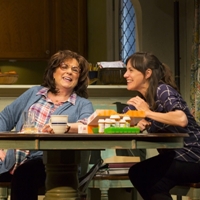
3-D Printer Model of Dining Car, Beowulf Boritt; photo: Vicki Weisfeld
McCarter Theatre Center’s annual Backstage Tour was expertly timed this year. Participants got the inside scoop on the fantastic sets and costumes created for the world premiere of Ken Ludwig’s Murder on the Orient Express, directed by McCarter artistic director Emily Mann.
Because McCarter does an elaborate version of A Christmas Carol every December, the production team couldn’t start creating the sets and costumes for Agatha Christie’s iconic story until early January, explained David York, the quiet genius who is McCarter’s Director of Production.
By then, they had the costume sketches from six-time Tony winner William Ivey Long, and the set designer, in this case Tony Award-winning Beowulf Boritt, had presented the production team with a highly detailed model of the set produced by a 3-D printer. Creating the sets and costumes involved thirty-five crew members and some seven thousand hours of labor, first in the construction and costume shops, then, in a week of very long days, making everything work on stage.

Portion of the stage set, Murder on the Orient Express, McCarter Theatre; photo: Vicki Weisfeld
The production team built two and a half truly spectacular railway cars that travel back and forth across the stage, using a braided wire rope system, much like San Francisco’s cable cars. The production also required a gorgeous new curtain, which has moving panels that can mask portions of the set, as needed. (Four painters spent four {?} days stenciling the Turkish design on the curtain.) Once the timing of every aspect of the play was finalized, managing the rail car and curtain movement is computer-operated.
Prop Master Michele Sammarco described the high degree of authenticity the production crew strives for. In a brief scene, the railway conductor delivers a tray with a roll and coffee. The prop department decorated both sides of the cup with the period-correct Orient Express logo, a detail probably no one in the audience can see, but which conveys a sense of being “really there” for the cast. Similarly, eight characters need passports from different countries. All eight look different and include the correct cast member’s photo and information.
Getting both the big, splashy elements—like the railroad cars—as well as the innumerable small touches right makes a big difference in the quality of the theater-goer’s experience. They are why eighteen thousand people have rushed to see this show in its two and a half-week run. If you’re not one of them, you have until Sunday, April 2, to try to get tickets! Call the box office at 609-258-2787 or visit the box office online.










